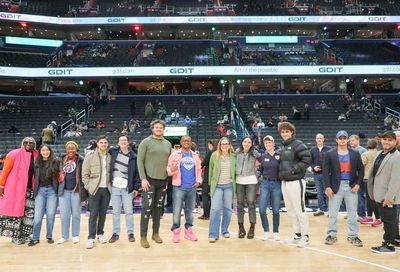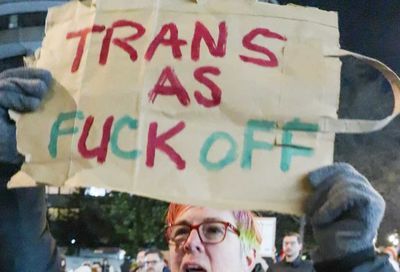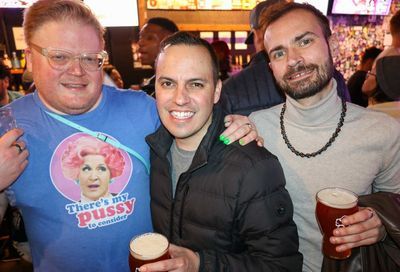Solicitor General Files Fair-minded DOMA Brief
Whatever comes next, Verrilli has shown himself to be an advocate for equality
The new media were ablaze on the evening of Feb. 22 after U.S. Solicitor General Donald Verrilli filed a brief in United States v. Windsor asking the Supreme Court to overturn Section 3 of the Defense of Marriage Act (DOMA). He performed a quietly brutal takedown of Paul Clement’s brief for the House Republicans, whose Bipartisan Legal Advisory Group (BLAG) has intervened to defend DOMA.
It is an historic breakthrough for the U.S. government’s top courtroom attorney to urge the high court to use “heightened scrutiny” in judging the constitutionality of laws that disfavor gays and lesbians. Decades of gay-rights activism are rolled up into Verrilli’s beautifully written compilation of scientific evidence, precedent and incisive argument.
Shining through the brief is an unavoidable fact – or tens of thousands of them: the legally married gay and lesbian couples in nine states and the District of Columbia. Verrilli writes:
“Section 3 of DOMA targets the many gay and lesbian people legally married under state law for a harsh form of discrimination that bears no relation to their ability to contribute to society. It is abundantly clear that this discrimination does not substantially advance an interest in protecting marriage, or any other important interest. The statute simply cannot be reconciled with the Fifth Amendment’s guarantee of equal protection. The Constitution therefore requires that Section 3 be invalidated.”
Having noted the states’ rights provision in Section 2 (which is not under challenge), Verrilli writes, “[B]ecause Section 3 imposes no restriction on the ability of any state to provide for same-sex marriage, it does not substantially further any interest in preserving ‘traditional, heterosexual’ marriage.” He also states, “[I]t defies reason to suggest that Section 3 makes it any more likely that heterosexual individuals will marry or raise children together.”
Verrilli observes that the 1996 House Report on DOMA invoked “traditional notions of morality,” then he cites Lawrence v. Texas and lowers the boom: “Moral opposition to homosexuality, though it may reflect deeply held personal views, is not a legitimate policy objective that can justify unequal treatment of gay and lesbian people.”
As of this writing, the Department of Justice has yet to decide whether to file a brief in the other marriage case, Hollingsworth v. Perry, concerning California’s Prop. 8. The deadline for that is Feb. 28. Some are concerned that urging the court to establish marriage equality nationwide would push the marriage cases in an all-or-nothing direction. That could prompt “swing justice” Anthony Kennedy to back away from his egalitarian sentiments out of respect for states that are not ready to go there.
On the other hand, if the court (1) tosses out the Prop. 8 case on the grounds that Prop. 8’s defenders lack standing, and (2) overturns DOMA nationwide, same-sex spouses would win federal recognition without poking opposing states in the eye. This giant step forward would quickly show the inevitability of full equality coast to coast while minimizing any backlash. If, alternatively, an all-or-nothing push leaves us with nothing, it could set back our cause by a generation.
Those who demand everything right now would be wise to remember the years of backlash that followed the rulings in Brown v. Board of Education and Roe v. Wade. A sweeping court victory would not mean that our political work is done.
If standing is denied in Perry, the District Court ruling overturning Prop. 8 would prevail; but it is unclear whether it would apply beyond the two couples in the case. California’s attorney general could instruct town clerks to issue marriage licenses; how that would play out remains to be seen.
However Perry goes, we face a pivotal moment for marriage equality with a powerful ally in Solicitor General Donald Verrilli.
Richard J. Rosendall is a writer and activist. He can be reached at .
Support Metro Weekly’s Journalism
These are challenging times for news organizations. And yet it’s crucial we stay active and provide vital resources and information to both our local readers and the world. So won’t you please take a moment and consider supporting Metro Weekly with a membership? For as little as $5 a month, you can help ensure Metro Weekly magazine and MetroWeekly.com remain free, viable resources as we provide the best, most diverse, culturally-resonant LGBTQ coverage in both the D.C. region and around the world. Memberships come with exclusive perks and discounts, your own personal digital delivery of each week’s magazine (and an archive), access to our Member's Lounge when it launches this fall, and exclusive members-only items like Metro Weekly Membership Mugs and Tote Bags! Check out all our membership levels here and please join us today!




















